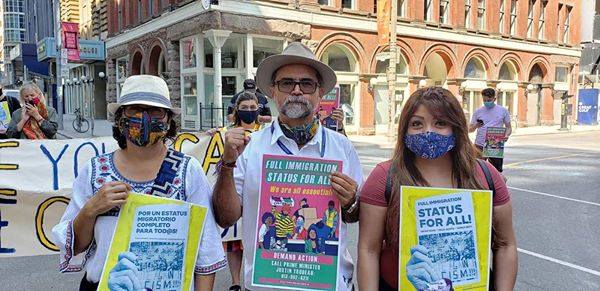
Read more
Blog, Labour markets & welfare states, Linking research, debates, and policies
Irregular migrants in Europe: Why national institutions matter for conditions and policy
In recent years, few public policy issues have created more heated public and political debates across European countries than irregular migration. National governments and the European Union as a whole have been under pressure...
Struggles over who has access to permanent immigration status in Canada have been fought with renewed intensity during and emerging from the COVID-19 pandemic. With less than two years before a federal election must be called, the country’s Liberal government risks wasting a historic opportunity to shift policy in more inclusive directions. It again raised hopes it would move in such a direction in mid-December.
A Shifted Immigration Model and Calls for Change
At times sparking significant controversy, Canada has witnessed a quickly growing population of people without permanent residence and the security, labour market freedoms, and social entitlements that it offers. In a significant shift in the country’s immigration model, both Liberal and Conservative governments have vastly expanded the use of migrant rather than immigrant labour and the number of international students attending post-secondary institutions. These students’ payment of much higher tuition fees heavily subsize the country’s “chronically” underfunded postsecondary education system.
Amidst economic uncertainty, concerns over housing costs, and a related decline in support for current immigration levels, Canada’s immigration Minister Marc Miller recently announced a cap on the number of international students to be permitted to study each year while criticizing private post-secondary institutions for exploiting these students. He has also warned of an overall “addiction” to migrant worker labour.
In this context there is growing awareness that official immigration levels are misleading if perceived as a full picture of the extent of migration to Canada. They represent only the number of people in a year granted permanent status, without accounting for the far higher number of those with a temporary or irregular immigration status. Many have planted roots and have hopes and expectations to stay permanently, often raised by actors who play major roles in their coming to Canada.
During the COVID-19 pandemic, attention to the fate of these growing number of non-permanent residents and their essential contributions grew. Reports and awareness raising campaigns by organizations such as the Migrant Rights Network and its members and allies made more visible the contributions made and exploitation and suffering experienced by many migrant workers. These contributed to increased attention and calls for – at a minimum – greatly expanded “pathways” to permanent residence, as well as more radical calls for “status for all.” Migrant workers and their allies highlighted the need for a more secure status by calling attention to the dangers they have continued to face on farms and in homes as caregivers, for example.
Enough Discursive Consensus for Inclusive Change?
As found in our CONTESTATIONS of Migration and Belonging project, the pandemic and its aftermath witnessed some hopeful signs. Those who have at least rhetorically committed to increasing access to permanent residence have included a diverse set of actors. These range from migrant workers, immigrant and refugee-supporting and advocacy organizations, labour unions, and the social democratic New Democratic Party – whose support Canada’s minority Liberal government relies on to stay in power – to business associations and the Conservative Party of Canada.
Prime Ministerial mandate letters that are to communicate government priorities to new and returning immigration ministers during the pandemic – and to the public since the current government chose to make them publicly available – have pointed to the need to prioritize pathways to regularization for undocumented workers and access to permanent residence for migrant workers more generally.
Though enacted to a far lesser extent in policies, hopes have been raised by Liberal government discourses and the confirmed understanding that the government has been examining proposals for a regularization program for those without status “contributing to Canadian communities.” This has sparked regularization program proposals from both academia and civil society.
While launching its short term “Temporary Resident to Permanent Resident Pathway” (TR2PR) program that included spots for 50,000 “essential” workers in 2021, then-Immigration Minister Marco Mendicino praised the contributions of migrant workers and international students while arguing the new program would hopefully prove to be a “watershed moment” that highlights the need for generational change in how Canada sees and treats “essential workers” and “guardian angels” at all skill levels.
The factors of a government expressing a pro-migrant disposition combined with – until recently – a lack of restrictionist pressures would seem to have presented an outstanding confluence of factors that might favour both a wide-ranging regularization program and significantly improved access to permanent immigration status for those without it. Unfortunately, like developments in parts of Europe, there seems to be stronger evidence of policy continuity and even the intensification of prior exclusionary trajectories.
The Political Centre to Right: “Pathways,” and Growing Pipelines of Migrant Workers
Discursively, from the centre to Canada’s mainstream right, including the Liberal government, the Conservative Party of Canada and business umbrella groups such as the Canadian Chamber of Commerce, increasing pathways to permanent residence for at least some migrant workers has been campaigned upon or welcomed.
While their new leader has been criticized by both mainstream and far right journalists for a lack of specificity in his own immigration proposals, the opposition Conservative Party of Canada’s 2021 election platform under former leader Erin O’Toole promised pathways “for those … prepared to work hard, contribute to the growth and productivity of Canada, and strengthen our democracy,” with employer sponsorship as a primary route. The Conservatives currently hold a significant lead in public opinion polls under new leader Pierre Poilievre. Poilievre seems to be sticking to pro-employer policies and long-term Conservative scripts of “law and order” immigration discourses alongside political outreach efforts to ethnicized and racialized voters – an approach I have elsewhere described as one of “neoconservative multiculturalism” – while appearing to rule out a regularization program.
Discourses of deservingness also feature in Liberal government rhetoric. A 2021 mandate letter specified building “on existing pilot programs to further explore ways of regularizing status for undocumented workers who are contributing to Canadian communities.” What has transpired since, however, demonstrates the limits of “hailing”: namely the rhetorical celebration of migrants and workers’ sacrifices over concrete policy change that would benefit them as time runs out in their mandate to do so.
In practice what has been prioritized are these actors’ common calls for a “trusted employer” program to facilitate greater access to migrant labour for businesses. Employer lobbying for greater and easier access to migrant labour has been met much faster than calls for regularization and increased pathways that were also part of government mandate letters. Also more highly prioritized was a mandate letter commitment to further exclude asylum seekers from crossing into Canada by “modernizing” the controversial Canada-US Safe Third Country Agreement to apply between formal ports of entry. This was also called for and sensationalized by Canada’s federal and Quebec provincial political right and far right.
Migrant Rights Activists and their Allies: More Urgent Calls and Demands for Equal Rights
The Liberal government’s parliamentary collaborators, the social democratic New Democratic Party, organized labour, and migrant rights activists have expressed particular concern with rights abuses and supressed wages experienced by those with temporary and precarious migration statuses. They have criticized recent permanent immigration levels plans for not sufficiently addressing these concerns by making sufficient space in those plans for those already living and working in Canada, including its undocumented population that – while difficult to estimate – surely continues to grow.
Migrant rights activists, allies, and many academics see poor working conditions and rights violations as an inevitable result of temporary statuses imposed on migrant and precarious status workers by government policy. They offer a different immigration imaginary and continue to work to build support nationally for calls for regularization and #Statusforall.
Unfortunately, until proven otherwise, recent pathways discourses and proposals – modest in actual practice – have mostly seemed to provide a way for actors with very different political and policy agendas to signal their commitment to immigrant and migrant rights without enacting them in practice. They do not necessarily demand more inclusive structural changes that would address the insecurity and labour, and human rights violations experienced by many living under temporary or precarious statuses. For that reason migrant rights activists have called them “minefields of abuse” that “retain all the problems inherent in temporary immigration status.”
With time running out, it remains to be seen if Canada’s Liberal government will devote its efforts into clearing this minefield, or to continuing to plant others in conventional and novel forms. Having waited so long, if it is indeed committed to enacting a regularization program or programs of any ambitious scope, it will need to draw upon positive discursive reservoirs recognizing the contributions of migrant workers and those without status accumulated during the pandemic. It will also need to combat simplistic discourses of “illegality” with explanations that shifts in Canada’s immigration model have greatly contributed to the growth of the country’s undocumented and migrant worker populations that now need to be urgently addressed.
—
John Carlaw is a Senior Research Associate at the Canada Excellence Research Chair (CERC) in Migration and Integration Program at Toronto Metropolitan University, and was visitor to the Migration Policy Centre in September-October, 2023.

